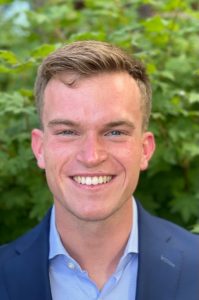
Michael Lundgren (SFS’22), a Georgetown alumnus dedicated to advancing early childhood care and education, has won the 2024 Marshall Scholarship, a prestigious fellowship program for scholars who demonstrate academic excellence.
Lundgren joins four other Hoyas who have also been named 2024 Marshall Scholars – marking the first time Georgetown has ever produced five or more Marshall Scholars.
The Hoyas join the ranks of 51 Marshall scholars nationwide. The scholarship selects outstanding American students to pursue their graduate education at any university in the United Kingdom. The Georgetown Center for Research and Fellowships oversees the Marshall Scholarship and several other UK fellowships, guiding students through the nomination and development process.
Lundgren will study child development and education and public policy during his two-year scholarship. In pursuing his graduate degrees at Oxford and the University of Glasgow, Lundgren has one main goal: fighting for a public early childhood care and education system in the U.S.
For Lundgren, his work is rooted in care. A caregiver for his late father, an aide at Georgetown’s childcare center, a researcher on how to create communities of care for children’s development, and now, a Marshall Scholar. Caring enough for change.
“A public early care and education system, impacting millions of American children, could dramatically improve community health and wellbeing,” he says. “Studying child development and public policy at Oxford will prepare me to lead and execute on my theory of change.”
An Unexpected Change
Lundgren began his time at Georgetown studying regional and comparative studies in the School of Foreign Service (SFS). His sophomore year, he was selected as a Lannan Fellow, a fellowship that explores the role of contemporary poetry, fiction and non-fiction in our world, and a Carroll Fellow, a Georgetown program for the most academically talented and ambitious undergraduates.
That same year, the COVID-19 pandemic hit, and Lundgren went home to care for his father, who was battling cancer. He balanced remote learning and helping his family care for his father, whom he was close to. He wrote poetry to process the day-to-day. A month after school ended, his father died. Overcome by loss, Lundgren took a leave of absence from Georgetown.
In 2021, he became a preschool aide at HoyaKids, a childcare center at Georgetown. “I thought it might help,” he said, “caring for someone else the way dad once cared for me.” His students didn’t know he was hurting, he said. He played games with them on the playground. Made them laugh. Taught Mandarin Chinese to colleagues who were working with Mandarin-speaking children.
Slowly, he saw changes in the classroom, like a four-year-old who only spoke Mandarin Chinese and became a multilingual five-year-old ready for kindergarten. Inspired by these changes, he returned to Georgetown — and he returned with a mission, Center for Research and Fellowships Director Lauren Tuckley says.
“When I first met Michael, I was immediately struck by his sensitivity to life, an extraordinary perceptiveness that makes him not only extremely empathetic but keenly adept at making connections across disparate realms of knowledge,” she says. “The future of early childhood education in our country could not be in better hands.”
A Cause for Care
Lundgren was determined to pursue a career in education, one that could transform early childhood education in particular. He interned at DC Public Schools in the Urban Education Leaders Internship Program (UELIP), which offers first-hand experience in the District’s education system. Through UELIP, Lundgren developed policy recommendations for supporting school-based coordinators.
After graduation, he was selected for the Coro Fellowship in Public Affairs, a civic leadership program that encourages young people to hone their skills to affect positive change. Among different placements, he designed a policy for providing free, universal early childhood care and education to all families in St. Louis.
“His resulting report and presentation provided us with a roadmap for achieving this vision, from helping us understand and navigate precedent, providing program design recommendations and preparing us to conduct meaningful engagement with on-the-ground stakeholders,” said Cristina Garmendia, policy director to the President of the Board of Aldermen in St. Louis. “Michael is already a force for change.”
After the fellowship, Lundgren reached out to Joan Lombardi, a veteran researcher in early childhood development who served as the first deputy assistant secretary for early childhood in the Obama Administration. Lombardi hired him as her research assistant, and he is now researching global examples of a community systems approach to child development. By looking at child development holistically, Lombardi is revolutionizing thinking about child development, and Lundgren’s research is playing a crucial role in developing effective policy solutions with this approach in mind.
“Michael has fully embodied the spirit of Georgetown’s core values: leadership in service of the greater good,” said Samuel Aronson, associate dean for the School of Foreign Service. “I know he’s destined to make a significant impact on every community lucky enough to have him as a member.” Aronson calls Lundgren the “most resilient and thoughtful person,” he’s ever advised in his 15 years at Georgetown.
For Lundgren, he’s determined to keep fighting for early childhood care and education – a cause he wants to work with other Marshall Scholars to champion. During his time as a Marshall Scholar, Lundgren wants to advocate for this transatlantic exchange of ideas on the issues that matter most to him by building relationships with leading early childhood experts and creating collaborative spaces to link practitioners in the U.S. and U.K.
“I have already benefited from UK-U.S. collaboration on a personal scale. I’ve learned from two mentors who are prominent early childhood experts—Naomi Eisenstadt in the UK and Joan Lombardi in the U.S.—each of whom led major child care programs for their respective governments. Our conversations have helped me identify a great need for transatlantic collaboration,” he says. “I will therefore use my time as a Marshall Scholar to work towards creating shared learning opportunities between the UK and U.S.”